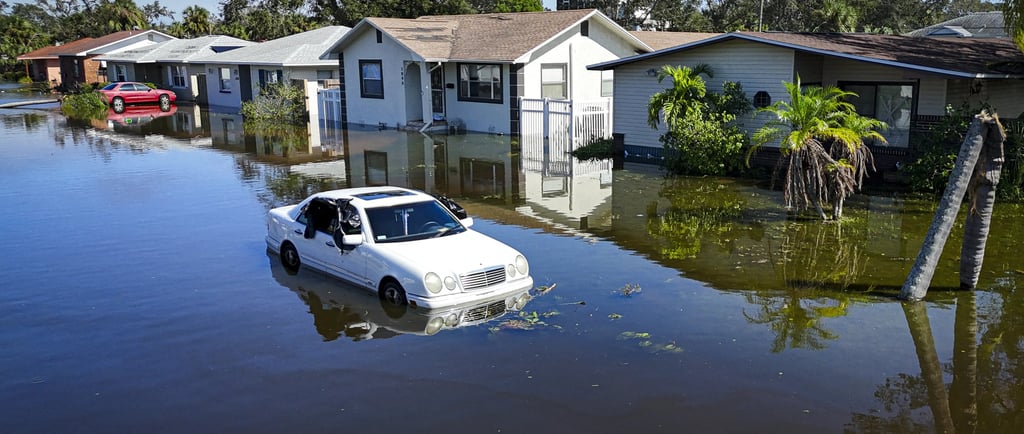United States: Hurricane Milton and the Potential Long-Term Impacts of Climate Change
Hurricane Milton has highlighted the severe consequences of climate change and its long-term economic implications. How will businesses respond to the growing need for climate resilience and sustainability?
UNITED STATES
Aisulu Sarmanova
10/11/20243 min read


Hurricane Milton, a devastating Category 5 storm, stands as a stark example of the intensifying impacts of climate change. Recognised as the second-most intense Atlantic hurricane recorded in the Gulf of Mexico, surpassed only by Hurricane Rita in 2005, Milton made landfall on Florida’s western coast shortly after Hurricane Helene's destructive sweep through the Big Bend region. The hurricane’s trail of destruction, reaching beyond Florida to Mexico and Cuba, underscores the urgent need for businesses and economies to adapt to a world increasingly shaped by climate change.
The immediate aftermath of Hurricane Milton illustrated the immense economic costs associated with extreme weather events. Estimated damages ranged from $30 to $50 billion, placing substantial pressure on infrastructure, supply chains, and local economies. For businesses, the disruption extended beyond physical damages; operations were halted, production delayed, and assets destroyed, leading to significant financial setbacks. Companies with robust disaster preparedness and climate adaptation strategies proved more resilient, demonstrating the critical importance of proactive planning.
The broader implications of climate change are already altering the economic landscape. The increased frequency and severity of hurricanes, floods, wildfires, and heatwaves are testing the resilience of various industries. Sectors that rely heavily on stable environmental conditions, such as agriculture, logistics, and energy, are particularly vulnerable. For these businesses, climate volatility is not just a distant threat but a current and escalating challenge to profitability and sustainability.
Hurricane Milton’s impact provides a window into the long-term challenges climate change poses to the business world. The consequences of extreme weather events push businesses to rethink their strategies and make significant changes in investment and risk management. The drive to address climate risks influences key areas of business operations:
Companies must prioritise investing in infrastructure that can withstand severe weather conditions. This includes reinforcing existing facilities, relocating critical operations away from high-risk areas, and integrating advanced engineering solutions. Such investments are essential to maintaining operational continuity during climate-related disruptions.
The fragility of global supply chains has been laid bare by climate events like Hurricane Milton. Businesses are now compelled to diversify suppliers and decentralise production to minimise risks associated with regional disruptions. Optimising transportation logistics and ensuring flexible supply chain strategies will become essential to adapting to unpredictable weather patterns.
The financial sector faces increased pressure as insurance premiums rise and coverage becomes more limited due to the growing frequency of climate disasters. Businesses must assess their exposure to climate-related risks and explore alternative financial safeguards, such as parametric insurance or self-insurance mechanisms, to protect against potential losses.
Despite the evident risks, climate change also presents opportunities for businesses to innovate and lead in a transitioning market. Hurricane Milton, like many recent climate disasters, emphasises the urgency for sustainable development and opens doors to new business models.
The push for a low-carbon economy has fuelled demand for renewable energy solutions and clean technologies. Companies that invest in solar, wind, and energy storage systems stand to benefit from government incentives and the growing market for sustainable energy. This shift not only contributes to climate mitigation but also positions businesses to capitalise on a market driven by environmental consciousness.
Sustainability is no longer optional for businesses aiming to stay competitive. The adoption of circular economy principles and eco-friendly practices enhances a company's appeal to environmentally aware consumers and can foster long-term brand loyalty. Hurricane Milton's aftermath serves as a reminder that sustainable practices can mitigate risks and strengthen a company's market position.
The demand for climate adaptation services, including disaster recovery and climate risk assessments, is increasing. Companies that offer expertise in building climate-resilient infrastructure and advising on sustainable practices will find ample opportunities. Governments and businesses in high-risk areas will increasingly seek partners who can support their adaptation efforts and build robust strategies for future challenges.
Public-private partnerships are becoming vital for advancing climate adaptation projects and securing the necessary funding. Collaborative efforts between businesses, governments, and international organisations can spur innovation and drive large-scale infrastructure improvements. Companies that engage in these partnerships can influence policy and contribute to shaping a more climate-resilient economy.
The legacy of Hurricane Milton serves as a pressing reminder of the challenges posed by climate change. Businesses must not only respond to immediate impacts but also plan for long-term shifts in market dynamics and policy developments. Climate-related regulations are becoming increasingly stringent, with governments implementing emissions targets, carbon pricing, and sustainability requirements. Companies that proactively adapt to these changes will minimise risks and unlock new opportunities.
Financial institutions will play a crucial role by supporting investment in climate adaptation and sustainability initiatives. Businesses that align with these trends can secure funding, enhance their resilience, and demonstrate leadership in addressing climate challenges.
The path ahead is formidable, requiring decisive and collaborative action from the business community. Addressing the impacts of climate change involves not only mitigating risks but also embracing opportunities for innovation and leadership. Companies that prioritise sustainable practices, reduce their carbon footprint, and invest in climate resilience will be at the forefront of a greener economy. Hurricane Milton’s devastating impact underscores the urgency for businesses to adapt and transform, positioning themselves as key players in building a sustainable future.


